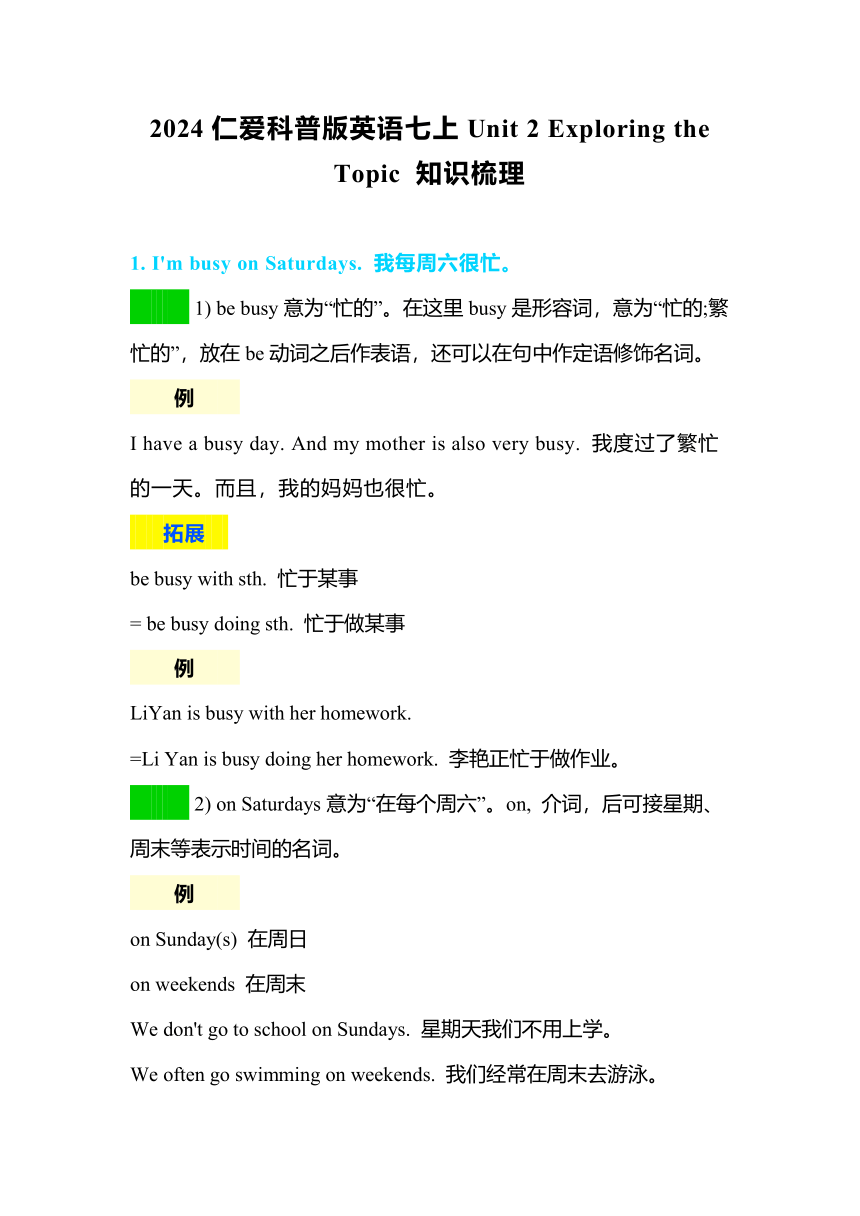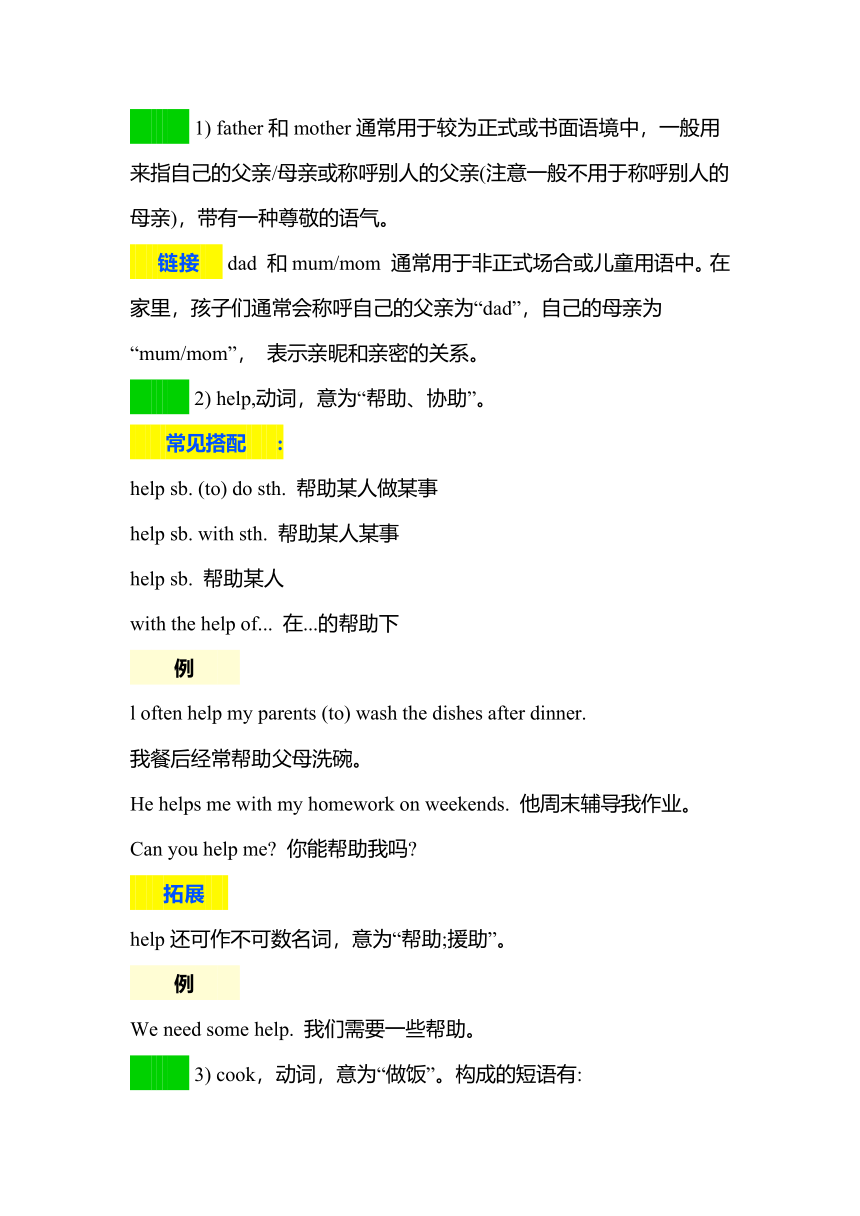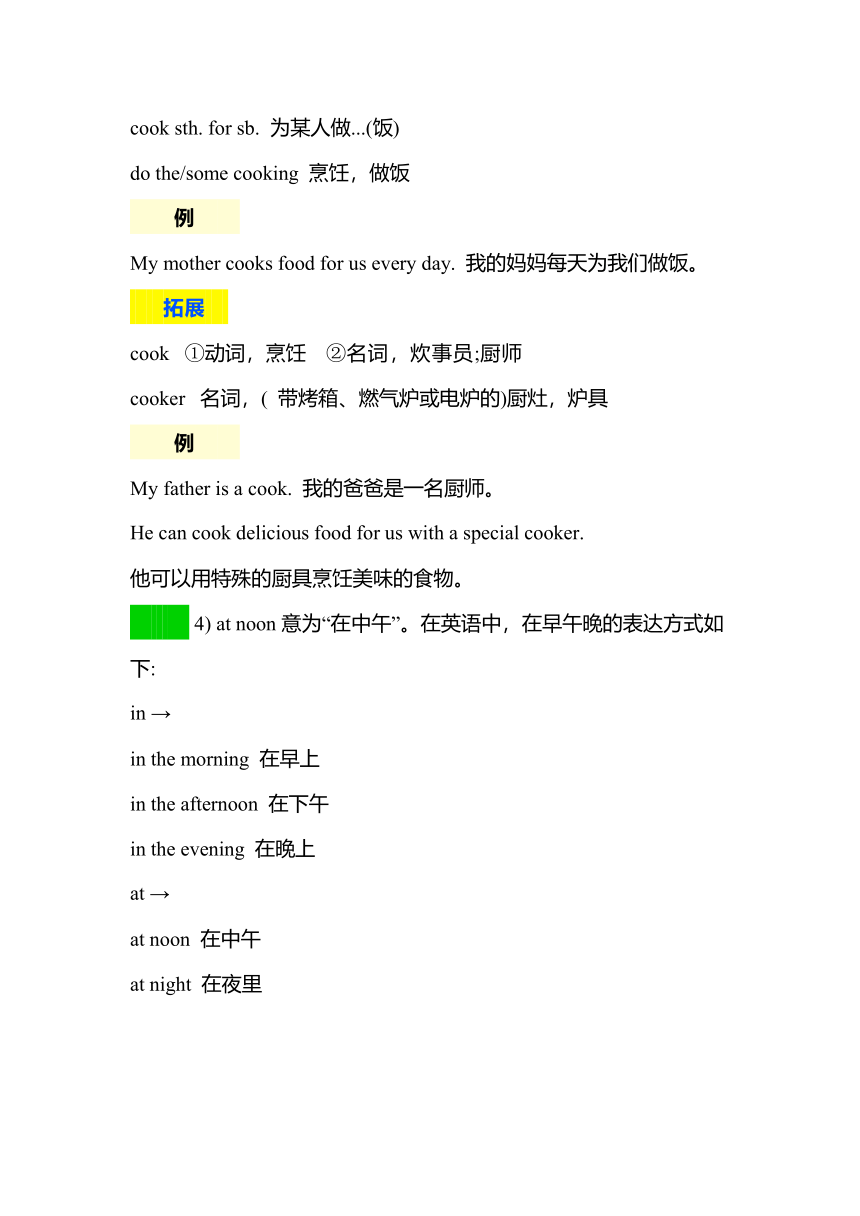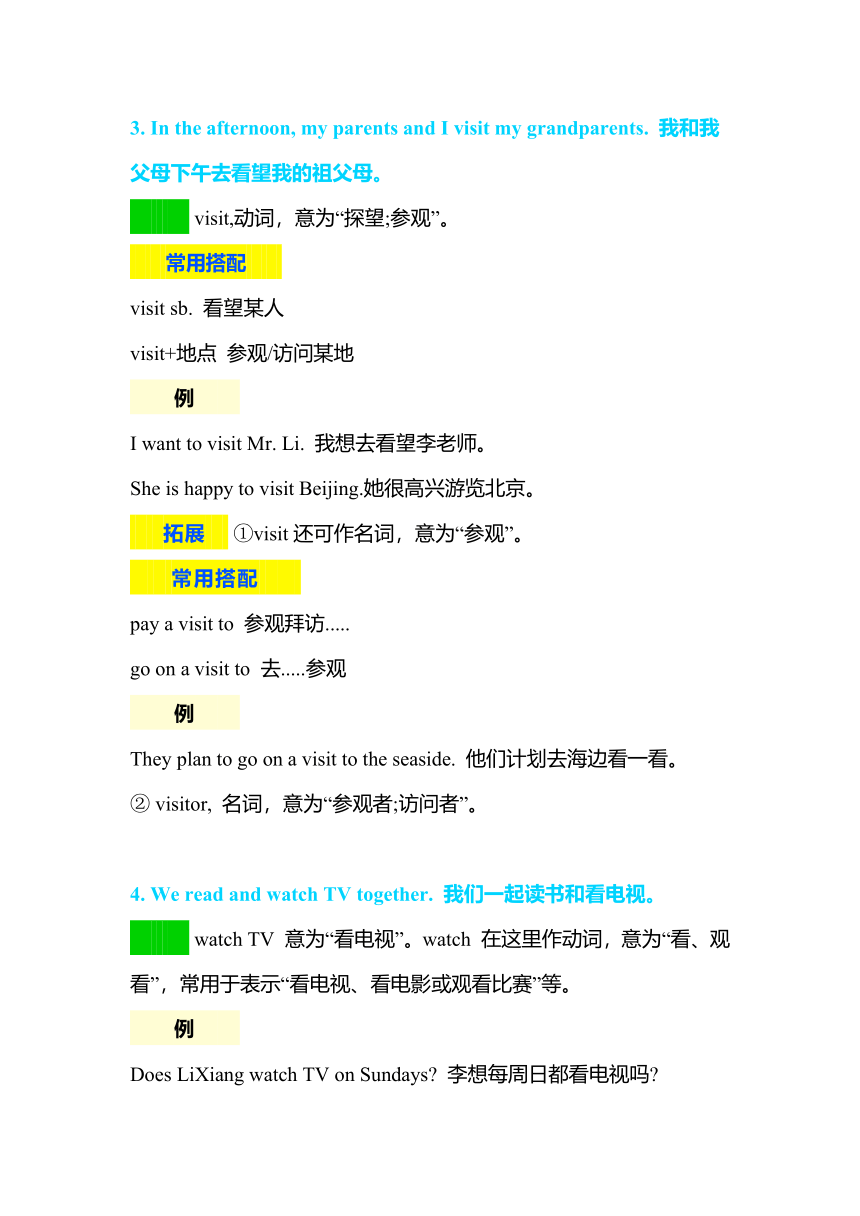仁爱科普版(2024)七年级上册Unit 2 Meet My Family!Exploring the Topic 知识梳理
文档属性
| 名称 | 仁爱科普版(2024)七年级上册Unit 2 Meet My Family!Exploring the Topic 知识梳理 |  | |
| 格式 | docx | ||
| 文件大小 | 28.5KB | ||
| 资源类型 | 教案 | ||
| 版本资源 | 仁爱科普版 | ||
| 科目 | 英语 | ||
| 更新时间 | 2024-10-05 20:22:57 | ||
图片预览





文档简介
2024仁爱科普版英语七上Unit 2 Exploring the Topic 知识梳理
1. I'm busy on Saturdays. 我每周六很忙。
1) be busy意为“忙的”。在这里busy是形容词,意为“忙的;繁忙的”,放在be动词之后作表语,还可以在句中作定语修饰名词。
例
I have a busy day. And my mother is also very busy. 我度过了繁忙的一天。而且,我的妈妈也很忙。
拓展
be busy with sth. 忙于某事
= be busy doing sth. 忙于做某事
例
LiYan is busy with her homework.
=Li Yan is busy doing her homework. 李艳正忙于做作业。
2) on Saturdays意为“在每个周六”。on, 介词,后可接星期、周末等表示时间的名词。
例
on Sunday(s) 在周日
on weekends 在周末
We don't go to school on Sundays. 星期天我们不用上学。
We often go swimming on weekends. 我们经常在周末去游泳。
辨析 on Saturdays 与on Saturday
on Saturdays 与 on Saturday都可以译成“在周六”,区别在于它们所表达的时间范围和频率。
on Saturdays 表示每个星期六,强调了动作的每周重复性。
例
I do the dishes on Saturdays. 我每周星期六都洗碗。
on Saturday 指的是在某个特定的星期六,单数形式强调具体的日期。
例
I have a party on Saturday. 我周六有个派对。
拓展 星期类词汇
Monday 星期一
Tuesday 星期二
Wednesday 星期三
Thursday 星期四
Friday 星期五
Saturday 星期六
Sunday 星期天
2. I play basketball with my father inthe morning and help my mothercook at noon. 我上午和爸爸打篮球,中午帮助妈妈做饭。
1) father和mother通常用于较为正式或书面语境中,一般用来指自己的父亲/母亲或称呼别人的父亲(注意一般不用于称呼别人的母亲),带有一种尊敬的语气。
链接 dad 和mum/mom 通常用于非正式场合或儿童用语中。在家里,孩子们通常会称呼自己的父亲为“dad”,自己的母亲为“mum/mom”, 表示亲昵和亲密的关系。
2) help,动词,意为“帮助、协助”。
常见搭配 :
help sb. (to) do sth. 帮助某人做某事
help sb. with sth. 帮助某人某事
help sb. 帮助某人
with the help of... 在...的帮助下
例
l often help my parents (to) wash the dishes after dinner.
我餐后经常帮助父母洗碗。
He helps me with my homework on weekends. 他周末辅导我作业。
Can you help me 你能帮助我吗
拓展
help还可作不可数名词,意为“帮助;援助”。
例
We need some help. 我们需要一些帮助。
3) cook,动词,意为“做饭”。构成的短语有:
cook sth. for sb. 为某人做...(饭)
do the/some cooking 烹饪,做饭
例
My mother cooks food for us every day. 我的妈妈每天为我们做饭。
拓展
cook ①动词,烹饪 ②名词,炊事员;厨师
cooker 名词,( 带烤箱、燃气炉或电炉的)厨灶,炉具
例
My father is a cook. 我的爸爸是一名厨师。
He can cook delicious food for us with a special cooker.
他可以用特殊的厨具烹饪美味的食物。
4) at noon意为“在中午”。在英语中,在早午晚的表达方式如下:
in →
in the morning 在早上
in the afternoon 在下午
in the evening 在晚上
at →
at noon 在中午
at night 在夜里
3. In the afternoon, my parents and I visit my grandparents. 我和我父母下午去看望我的祖父母。
visit,动词,意为“探望;参观”。
常用搭配
visit sb. 看望某人
visit+地点 参观/访问某地
例
I want to visit Mr. Li. 我想去看望李老师。
She is happy to visit Beijing.她很高兴游览北京。
拓展 ①visit还可作名词,意为“参观”。
常用搭配
pay a visit to 参观拜访.....
go on a visit to 去.....参观
例
They plan to go on a visit to the seaside. 他们计划去海边看一看。
② visitor, 名词,意为“参观者;访问者”。
4. We read and watch TV together. 我们一起读书和看电视。
watch TV 意为“看电视”。watch 在这里作动词,意为“看、观看”,常用于表示“看电视、看电影或观看比赛”等。
例
Does LiXiang watch TV on Sundays 李想每周日都看电视吗
They often watch football games together. 他们经常一起看足球赛。
拓展
watch 还可做名词,意为“手表”,其复数形式是watches。
例
Li Xiao has two watches. 李晓有两块手表。
5. We do chores together, too. 我们也一起做家务。
chore名词,意为“日常事务;例行工作”。句中do chores是一个固定搭配,意为“做家务”,可以与“do the housework"互换。
例
Ling Lin often helps her mother do chores after school.
=Ling Lin often helps her mother do the housework after school.
凌琳经常放学后帮助她妈妈做家务。
6. She lives with her grandparents, parents, uncles, aunts, brothers, sisters and cousins. 她和她的祖父母、父母、叔叔、婶婶、哥哥、姐姐和堂,兄弟住在一起。
live,动词,意为“居住,住”。
常用搭配
live with sb. 和某人住在一起
live in+地点 住在某地
例
My grandparents live with us. 我的祖父母和我们住在一起。
My sister lives in Beiing. 我姐姐住在北京。
拓展
live with sb. in +地点
=live in+地点+ with sb. 和某人住在某地
例
I live with my parents in Beijing.
= I live in Beiing with my parents. 我和我的父母住在北京。
7. They are very busy most of the time. 他们大多数时间很忙。
most of the +可数名词复数/不可数名词,意为“大多数的,几乎全部的”,指数量上占据多数或几乎全部的情况。
例
Most of these books are my uncle's. 这些书大多是我叔叔的。
8. But after work, we do many things together. 但是下班后,我们一起做很多事情。
after,介词,意为“在...之后”。
例
I usually play sports with my friends after school. 我通常在放学后和我的朋友们一起做运动。
归纳 after的用法
after ①介词,意为“在....之后”。与时间点连用,常用于将来时;还可与一段时间连用,常用于过去时。
例
I will get home after five o'clock. 我将在5点之后到家。
after ②介词,意为“在....之后”。常与某些表示活动的名词连用。
例
after school 放学后
after dinner 晚餐后
after ③连词, 意为“在...之后”。用来引导时间状语从句。其反义词是before, 意为“在....之前"
例
I will go to the park after I finish my homework. 在我做完作业之后,我会去公园。
9. We often visit them on weekends and have dinner together. 我们经常在周末去拜访他们并一起吃晚饭。
1) on weekends 意为“在周末”,一般指在星期六和星期天。weekday意为“工作日”,指的是从周一到周五。
例
They often go to the park on weekends. 周末他们经常去公园。
2) dinner, 名词,意为“晚餐或正餐”。
常用短语 have dinner 吃晚餐 after dinner 晚餐后 at dinner 吃晚餐时 before dinner 晚餐前
例
Lingling usually has dinner at home. And she sometimes do chores after dinner. 玲玲通常在家里吃晚饭,而且晚饭后她有时会做些家务。
链接 英语中一天三餐的 表达方式分别是:
词汇 词义 短语
breakfast 早餐 have breakfast 吃早餐
lunch 午餐 have lunch 吃午饭
supper 晚餐,夜宵 have supper 吃晚饭
dinner 晚餐;正餐;宴会 have dinner 吃饭
注意 在英语中,表达日三餐前的名词前一般没有冠词。如果三餐前有修饰词,前面通常用不定冠词a/an。
例
I have lunch at home. 我在家吃午餐。
After a big breakfast, I go to school. 吃了丰盛的早餐后,我上学去了。
10. We all do something for dinner. 我们都为晚饭做些事情。
1) something, 不定代词,意为“某事、某物”,一般用于肯定句中。在句中作主语时,谓语动词要用第三人称单数形式。
例
I have something to say. 我有话要说。
注意 some things意为“一 些事情、一些物品”。
例
l often buy some things after work. 下班后我经常去买一些东西。
2) for, 介词,与一日三餐搭配使用时,表示各餐所吃的食物。
例
I like bread for breakfast. 我早餐喜欢吃面包。
拓展 for 作介词时的其他意思:
① 对于;关于
For dinner, I like eating with my family. 关于晚餐,我喜欢和家人一起吃。
② 为了, 用于;表示目的或用途
It's a book for children. 这是本儿童读物。
③ 对(某人)来说(困难、必需、愉快等)
It's happy for us to join you. 我们很高兴能加人你们。
④ 表示一段时间
I'm going away for a few days. 我要离开几天。
11. My sister helps our grandparents set the table and I clean up with my father after dinner. 我妹妹帮助爷爷奶奶摆放餐具,而我在饭后和爸爸一起打扫。
1) set, 动词,意为“摆放餐具”。set the table意为“准备餐具”。
例
Could you set the table for dinner 你把餐具摆好,准备开饭,好吗
拓展
set 还可作名词,意为“电视机”。
例
a TV set 一台电视机。
My brother has a toy TV set.
我弟弟有一台玩具电视机。
2) table,名词,意为“桌子;表,一览表”。
例
There are ten tables in the room. 这个房间有10 张桌子。
Please look at this table. 请看这张表。
3) clean up意为“打扫(或清除)干净”; clean 在这里作动词,意为“打扫; 使...干净; .除去....的灰尘”。
例
Does she help clean up after dinner 她晚饭后帮忙打扫吗
Mary often helps clean the house on weekends. 玛丽每周末都帮忙打扫房子。
拓展
clean ①形容词, 意为“洁净的;干净的;爱干净的;无污染的;清新的”。
②名词,意为“打扫;清扫”。
例
Are your hands clean 你的手干净吗
Cats are very clean animals. 猫是很爱干净的动物。
clean water/air 清洁的水/空气
The house needs a good clean. 这房子需要好好打扫。
12. He loves his job. 他热爱他的工作。
job,名词,意为“工作;职业;岗位”,指某种具体的工作。
例
She likes this job. 她喜欢这份工作。
辨析 job和work
job 可数名词,指具体的职业或工作。
work 不可数名词,指抽象的、不具体的工作,强调通过努力达成的工作。
例
What is your job 你是做什么工作的
I have much work to do. 我有很多工作要做。
13. He plays it very well. 他弹(吉他)得非常好。
well, 副词,意为“好地”,表示程度“好”,要用副词well修饰动词,不能用形容词good。
例
She draws well. 她画得很好。
辨析 well 和good
well
① 作形容词时,意为“健康的;身体好的”,其同义词为fine。
② 作副词时,意为“好地”,用在动词后,修饰动词。
③ 作语气词,意为“哦;好吧”。
good 作形容词,意为“好的”,常用来修饰名词。
例
She is very well. 她身体很好。
She plays football very well.
她足球踢得很好。
Well, let' S go to the park. 好吧,让我们去公园吧。
He is a good boy. 他是一个好男孩。
1. I'm busy on Saturdays. 我每周六很忙。
1) be busy意为“忙的”。在这里busy是形容词,意为“忙的;繁忙的”,放在be动词之后作表语,还可以在句中作定语修饰名词。
例
I have a busy day. And my mother is also very busy. 我度过了繁忙的一天。而且,我的妈妈也很忙。
拓展
be busy with sth. 忙于某事
= be busy doing sth. 忙于做某事
例
LiYan is busy with her homework.
=Li Yan is busy doing her homework. 李艳正忙于做作业。
2) on Saturdays意为“在每个周六”。on, 介词,后可接星期、周末等表示时间的名词。
例
on Sunday(s) 在周日
on weekends 在周末
We don't go to school on Sundays. 星期天我们不用上学。
We often go swimming on weekends. 我们经常在周末去游泳。
辨析 on Saturdays 与on Saturday
on Saturdays 与 on Saturday都可以译成“在周六”,区别在于它们所表达的时间范围和频率。
on Saturdays 表示每个星期六,强调了动作的每周重复性。
例
I do the dishes on Saturdays. 我每周星期六都洗碗。
on Saturday 指的是在某个特定的星期六,单数形式强调具体的日期。
例
I have a party on Saturday. 我周六有个派对。
拓展 星期类词汇
Monday 星期一
Tuesday 星期二
Wednesday 星期三
Thursday 星期四
Friday 星期五
Saturday 星期六
Sunday 星期天
2. I play basketball with my father inthe morning and help my mothercook at noon. 我上午和爸爸打篮球,中午帮助妈妈做饭。
1) father和mother通常用于较为正式或书面语境中,一般用来指自己的父亲/母亲或称呼别人的父亲(注意一般不用于称呼别人的母亲),带有一种尊敬的语气。
链接 dad 和mum/mom 通常用于非正式场合或儿童用语中。在家里,孩子们通常会称呼自己的父亲为“dad”,自己的母亲为“mum/mom”, 表示亲昵和亲密的关系。
2) help,动词,意为“帮助、协助”。
常见搭配 :
help sb. (to) do sth. 帮助某人做某事
help sb. with sth. 帮助某人某事
help sb. 帮助某人
with the help of... 在...的帮助下
例
l often help my parents (to) wash the dishes after dinner.
我餐后经常帮助父母洗碗。
He helps me with my homework on weekends. 他周末辅导我作业。
Can you help me 你能帮助我吗
拓展
help还可作不可数名词,意为“帮助;援助”。
例
We need some help. 我们需要一些帮助。
3) cook,动词,意为“做饭”。构成的短语有:
cook sth. for sb. 为某人做...(饭)
do the/some cooking 烹饪,做饭
例
My mother cooks food for us every day. 我的妈妈每天为我们做饭。
拓展
cook ①动词,烹饪 ②名词,炊事员;厨师
cooker 名词,( 带烤箱、燃气炉或电炉的)厨灶,炉具
例
My father is a cook. 我的爸爸是一名厨师。
He can cook delicious food for us with a special cooker.
他可以用特殊的厨具烹饪美味的食物。
4) at noon意为“在中午”。在英语中,在早午晚的表达方式如下:
in →
in the morning 在早上
in the afternoon 在下午
in the evening 在晚上
at →
at noon 在中午
at night 在夜里
3. In the afternoon, my parents and I visit my grandparents. 我和我父母下午去看望我的祖父母。
visit,动词,意为“探望;参观”。
常用搭配
visit sb. 看望某人
visit+地点 参观/访问某地
例
I want to visit Mr. Li. 我想去看望李老师。
She is happy to visit Beijing.她很高兴游览北京。
拓展 ①visit还可作名词,意为“参观”。
常用搭配
pay a visit to 参观拜访.....
go on a visit to 去.....参观
例
They plan to go on a visit to the seaside. 他们计划去海边看一看。
② visitor, 名词,意为“参观者;访问者”。
4. We read and watch TV together. 我们一起读书和看电视。
watch TV 意为“看电视”。watch 在这里作动词,意为“看、观看”,常用于表示“看电视、看电影或观看比赛”等。
例
Does LiXiang watch TV on Sundays 李想每周日都看电视吗
They often watch football games together. 他们经常一起看足球赛。
拓展
watch 还可做名词,意为“手表”,其复数形式是watches。
例
Li Xiao has two watches. 李晓有两块手表。
5. We do chores together, too. 我们也一起做家务。
chore名词,意为“日常事务;例行工作”。句中do chores是一个固定搭配,意为“做家务”,可以与“do the housework"互换。
例
Ling Lin often helps her mother do chores after school.
=Ling Lin often helps her mother do the housework after school.
凌琳经常放学后帮助她妈妈做家务。
6. She lives with her grandparents, parents, uncles, aunts, brothers, sisters and cousins. 她和她的祖父母、父母、叔叔、婶婶、哥哥、姐姐和堂,兄弟住在一起。
live,动词,意为“居住,住”。
常用搭配
live with sb. 和某人住在一起
live in+地点 住在某地
例
My grandparents live with us. 我的祖父母和我们住在一起。
My sister lives in Beiing. 我姐姐住在北京。
拓展
live with sb. in +地点
=live in+地点+ with sb. 和某人住在某地
例
I live with my parents in Beijing.
= I live in Beiing with my parents. 我和我的父母住在北京。
7. They are very busy most of the time. 他们大多数时间很忙。
most of the +可数名词复数/不可数名词,意为“大多数的,几乎全部的”,指数量上占据多数或几乎全部的情况。
例
Most of these books are my uncle's. 这些书大多是我叔叔的。
8. But after work, we do many things together. 但是下班后,我们一起做很多事情。
after,介词,意为“在...之后”。
例
I usually play sports with my friends after school. 我通常在放学后和我的朋友们一起做运动。
归纳 after的用法
after ①介词,意为“在....之后”。与时间点连用,常用于将来时;还可与一段时间连用,常用于过去时。
例
I will get home after five o'clock. 我将在5点之后到家。
after ②介词,意为“在....之后”。常与某些表示活动的名词连用。
例
after school 放学后
after dinner 晚餐后
after ③连词, 意为“在...之后”。用来引导时间状语从句。其反义词是before, 意为“在....之前"
例
I will go to the park after I finish my homework. 在我做完作业之后,我会去公园。
9. We often visit them on weekends and have dinner together. 我们经常在周末去拜访他们并一起吃晚饭。
1) on weekends 意为“在周末”,一般指在星期六和星期天。weekday意为“工作日”,指的是从周一到周五。
例
They often go to the park on weekends. 周末他们经常去公园。
2) dinner, 名词,意为“晚餐或正餐”。
常用短语 have dinner 吃晚餐 after dinner 晚餐后 at dinner 吃晚餐时 before dinner 晚餐前
例
Lingling usually has dinner at home. And she sometimes do chores after dinner. 玲玲通常在家里吃晚饭,而且晚饭后她有时会做些家务。
链接 英语中一天三餐的 表达方式分别是:
词汇 词义 短语
breakfast 早餐 have breakfast 吃早餐
lunch 午餐 have lunch 吃午饭
supper 晚餐,夜宵 have supper 吃晚饭
dinner 晚餐;正餐;宴会 have dinner 吃饭
注意 在英语中,表达日三餐前的名词前一般没有冠词。如果三餐前有修饰词,前面通常用不定冠词a/an。
例
I have lunch at home. 我在家吃午餐。
After a big breakfast, I go to school. 吃了丰盛的早餐后,我上学去了。
10. We all do something for dinner. 我们都为晚饭做些事情。
1) something, 不定代词,意为“某事、某物”,一般用于肯定句中。在句中作主语时,谓语动词要用第三人称单数形式。
例
I have something to say. 我有话要说。
注意 some things意为“一 些事情、一些物品”。
例
l often buy some things after work. 下班后我经常去买一些东西。
2) for, 介词,与一日三餐搭配使用时,表示各餐所吃的食物。
例
I like bread for breakfast. 我早餐喜欢吃面包。
拓展 for 作介词时的其他意思:
① 对于;关于
For dinner, I like eating with my family. 关于晚餐,我喜欢和家人一起吃。
② 为了, 用于;表示目的或用途
It's a book for children. 这是本儿童读物。
③ 对(某人)来说(困难、必需、愉快等)
It's happy for us to join you. 我们很高兴能加人你们。
④ 表示一段时间
I'm going away for a few days. 我要离开几天。
11. My sister helps our grandparents set the table and I clean up with my father after dinner. 我妹妹帮助爷爷奶奶摆放餐具,而我在饭后和爸爸一起打扫。
1) set, 动词,意为“摆放餐具”。set the table意为“准备餐具”。
例
Could you set the table for dinner 你把餐具摆好,准备开饭,好吗
拓展
set 还可作名词,意为“电视机”。
例
a TV set 一台电视机。
My brother has a toy TV set.
我弟弟有一台玩具电视机。
2) table,名词,意为“桌子;表,一览表”。
例
There are ten tables in the room. 这个房间有10 张桌子。
Please look at this table. 请看这张表。
3) clean up意为“打扫(或清除)干净”; clean 在这里作动词,意为“打扫; 使...干净; .除去....的灰尘”。
例
Does she help clean up after dinner 她晚饭后帮忙打扫吗
Mary often helps clean the house on weekends. 玛丽每周末都帮忙打扫房子。
拓展
clean ①形容词, 意为“洁净的;干净的;爱干净的;无污染的;清新的”。
②名词,意为“打扫;清扫”。
例
Are your hands clean 你的手干净吗
Cats are very clean animals. 猫是很爱干净的动物。
clean water/air 清洁的水/空气
The house needs a good clean. 这房子需要好好打扫。
12. He loves his job. 他热爱他的工作。
job,名词,意为“工作;职业;岗位”,指某种具体的工作。
例
She likes this job. 她喜欢这份工作。
辨析 job和work
job 可数名词,指具体的职业或工作。
work 不可数名词,指抽象的、不具体的工作,强调通过努力达成的工作。
例
What is your job 你是做什么工作的
I have much work to do. 我有很多工作要做。
13. He plays it very well. 他弹(吉他)得非常好。
well, 副词,意为“好地”,表示程度“好”,要用副词well修饰动词,不能用形容词good。
例
She draws well. 她画得很好。
辨析 well 和good
well
① 作形容词时,意为“健康的;身体好的”,其同义词为fine。
② 作副词时,意为“好地”,用在动词后,修饰动词。
③ 作语气词,意为“哦;好吧”。
good 作形容词,意为“好的”,常用来修饰名词。
例
She is very well. 她身体很好。
She plays football very well.
她足球踢得很好。
Well, let' S go to the park. 好吧,让我们去公园吧。
He is a good boy. 他是一个好男孩。
同课章节目录
